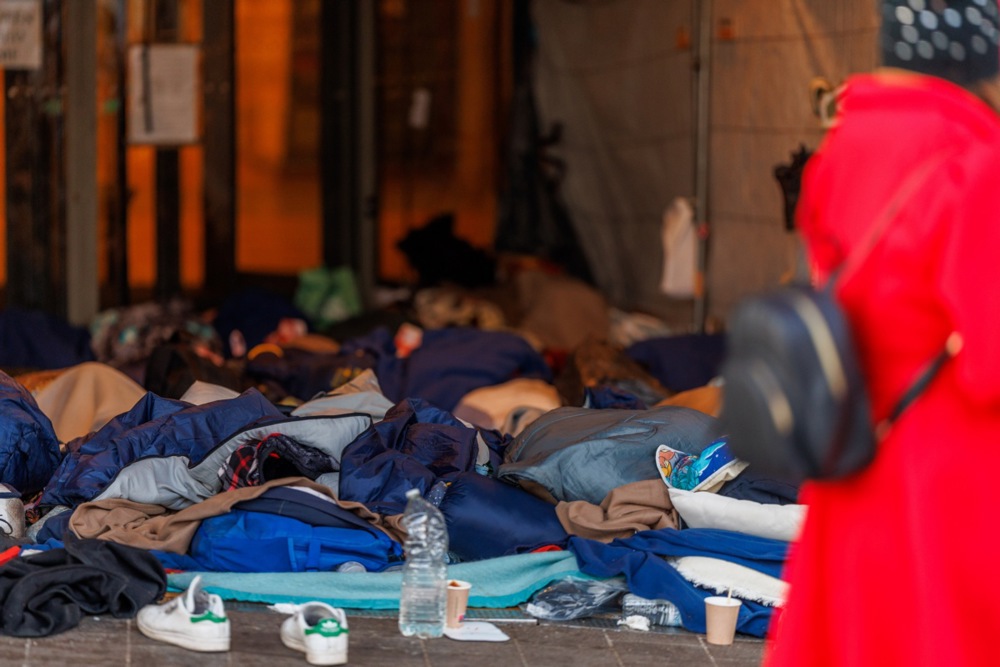The Dutch Council of State has ruled that the Netherlands no longer can return single male asylum seekers to Belgium because of “structural failures” in the Belgian migrant sheltering system that violated human rights.
According to European law, member states can send migrants back to the countries where they filed their first asylum application, in line with the Dublin Regulation.
But, according to the Dutch Council of State, the shortcomings in the reception conditions and legal protection for this group in Belgium were “so structural” that they would likely end up on the streets on return.
Due to this “systemic failure”, these people would no longer be able to meet their basic needs, which, according to the administrative judge, was a violation of human rights.
The council made the ruling in a case initiated by a 24-year-old Afghan man who arrived in Belgium but requested asylum in the Netherlands.
He was to be sent back to Belgium because the Dutch did not want to process him but, in Belgium, he reportedly would not be received at reception facilities.
The Afghan took his case to the court to challenge his eviction.
The Council of State ruled that the transfer deadline had already expired on January 4, 2025, and that the Dutch administration could no longer transfer him back to Belgium.
It went on to address the legal questions regarding the Dublin procedure in this case.
“Indeed, an administrative body may have an interest in the appeal, if only because of the precedential effect of an appeal ruling in similar cases”, the court stated.
It found that the waiting list for reception places in Belgium had risen, that the number of emergency shelter spaces promised by the Belgian authorities has not been delivered and that it remained unclear whether relevant people could rely on homeless shelters.
It also considered that the lack of shelter severely limited access to medical and legal assistance. In addition, it stated that filing complaints in Belgium was effectively pointless as the authorities routinely failed to comply with court rulings.
For these reasons, the court concluded that the authorities could not simply assume — without further investigation — that the person concerned would not face extreme material deprivation upon return to Belgium, as defined by the European Court of Justice in its judgment of March 19, 2019.
In an earlier ruling, a lower judge at the time said the Afghan could be sent back because there were provisions for emergency shelter, homeless accommodation and medical and legal services in Belgium. He did add that the reception in Belgium was poor.
The Belgian Government had promised to improve the situation, but, according to the Dutch Council of State, it failed to do so and the problems could no longer be seen as temporary but were structural.
It noted “an indifference on the part of the Belgian authorities to resolve the shortcomings in reception and legal protection”.
According to the court, migrants lived in uncertainty because Belgian authorities “fail to comply with court rulings and pay penalty payments”.
It admitted it was a serious issue, eroding European deals and co-operation but “based on facts, it has been judged that people are at risk of inhumane treatment”.
Dutch politician Geert Wilders claimed the ruling could cause more migrants to remain in the Netherlands.
“I’ve had enough of those troublemakers at the Council of State. Both the Judicial and Advisory divisions are largely made up of failed politicians from D66, VVD, CDA, and other left-leaning parties, led by PVV and Pim Fortuyn critic Thom de Graaf (D66)”, he said on X.
Migration expert Jan van de Beek said he was baffled by the ruling.
“Dutch politicians who want to limit asylum migration are almost being forced into creating a failing reception system themselves,” he said.
“If you set up a functioning system, you end up having to take in male asylum seekers from Belgium …
How out of touch can it get?”
In a written statement to Belgian media, Migration and Asylum Minister Anneleen Van Bosuyt said that “she inherited an asylum crisis”.
“This country is already shouldering more responsibility today than is proportionate within Europe. Our society can no longer bear this burden,” Van Bossuyt stated.
She emphasised that the issue was not one of “indifference”, as the court ruling suggested but rather the result of years of structural overstrain.
“That’s why we are now firmly focusing on a policy built around three pillars: limiting the influx, increasing the outflow, and preventing abuse of the asylum procedure. This is essential in order to offer humane protection to those who are genuinely entitled to it,” she said.
Van Bossuyt added that the current waiting list for single men without shelter was shrinking and that the next person on the list was invited into the regular reception system as soon as a place became available.





